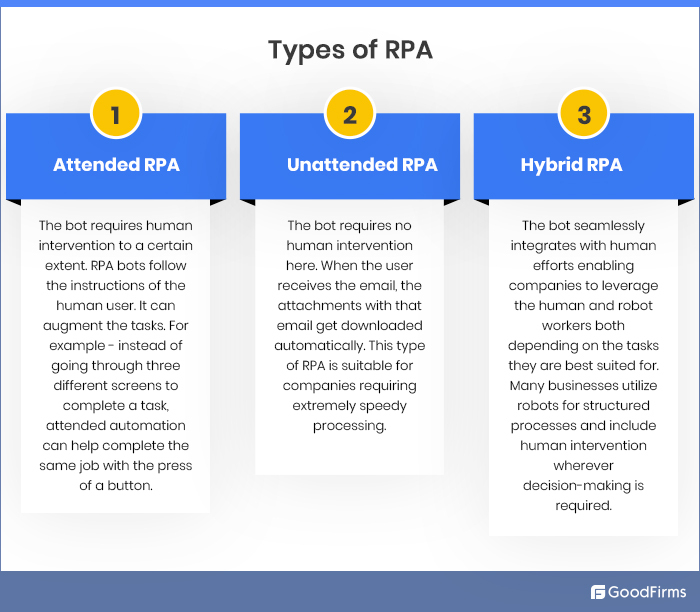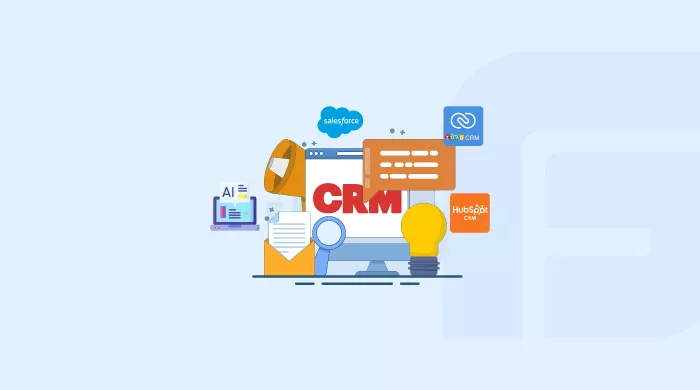Customer relationship management is known for bridging the gap between enterprises and customers by providing crystal clear visibility of every customer detail. It also helps sales and marketing professionals to deliver accurate and quality services to the customers ultimately leading to growth of the business. For businesses, CRM software is prevalently used across different departments and that makes it highly prone to errors. Moreover, CRM requires a skilled human workforce to make the most out of it and fulfill the purpose of its existence within the organization. Automating CRM using RPA (Robotic Process Automation) integration can help in minimizing human efforts required to operate it and at the same time reduce the chances of errors that spoil customer relationships.
Integrating RPA into CRM can be overwhelming and a crucial decision to make for many companies. But, as CRM with RPA has proven to be highly effective and beneficial for the businesses, many organizations are quickly adopting to provide better customer experiences and stay competitive.
So will CRM with RPA can actually prove to be a magic bullet for your business or is it just a hype created with little or no substance?
To find the answer to this question, let's start with basic information about CRM and RPA and then delve into the details about whether CRM with RPA or CRM without RPA would be right for your business.
What is CRM?
CRM is a systematic approach that involves managing relationships and interactions with existing and future customers. CRM software is used to streamline all the processes within the organization's sales, marketing, and service departments. It is a cross-departmental tool that allows all the employees within these facets of the organization to access the same information, stay connected, and collaborate effectively, ultimately achieving the goal of building and enhancing relationships with the customers and gaining an advantage over the marketplace.

Thus, CRM provides a 360-degree view of customers, employees, suppliers, and overall business. But, acquiring the best out of CRM requires human efforts to complete repetitive tasks, juggling between different modules within the platform, sending emails, generating reports, entering data, and all the monotonous work that requires cutting, copying, and pasting.
Integrating RPA into CRM takes away all this hard work necessary to do but is cumbersome and time-consuming. So what is RPA, and how does it help in automating CRM? Let's dive into the details.
What is RPA (Robotic Process Automation)?
Robotic Process Automation (RPA) is an advanced technology that can be integrated into software applications to automate repetitive and time-consuming manual tasks like data entry, finding information, escalating customer issues, sending routine emails, and many more. Robotic Process Automation is known to mimic the activity of humans and take automation to the next level.
AI-driven robotic process automation helps boost productivity, save time, and improve efficiency as it entirely replaces routine and error-prone tasks, which are done manually even today in many organizations. It can completely eliminate human intervention and free your employees for more strategic, decision-based, and revenue-generating jobs.
In technical terms, RPA helps create bots that monitor and replicate users' interactions while performing a task. Generally, there are three types of RPA based on their mechanism -

So, now that we have the basic information about CRM and RPA, let's try to understand why you need to invest in RPA technology now and its operational benefits.
Why Do You Need to Invest in RPA Technology Now?
RPA technology enables robots to do repetitive and time-consuming tasks and allows humans to focus on more revenue generating and strategic activities. The tasks like moving files and folders, data entry, filling forms, routine emails, etc., are all handled by the robots. Now as RPA is advancing it can even perform cognitive tasks like interpreting languages and replying to the chats and conversations, understanding and analyzing unstructured data, and applying machine learning techniques to make complex decisions.
There is no hype in saying that RPA is transforming the way businesses are progressing these days. In this competitive business scenario, when companies are overcoming the side effects of the economic recession caused due to the pandemic there is one thing that can help them survive and grow is - adapting emerging technologies.
Replacing manual processes with automation is the need of the hour now. Dependence on human resources for many tasks is obsolete and automation can help companies deliver agile and quality products and services, stay competitive and lead their respective industries.
To elaborate further on this let’s have a look at some operational benefits of RPA that can power up your business.

RPA is often confused with traditional automation. Let’s have a look at the differences between both of them to gain more understanding on this subject.
How Does RPA Differ From Traditional Automation?

RPA ultimately helps companies to save time and money and at the same time deliver high-quality products and services that ultimately leads to better business and profitability. But, the questions that still remain unanswered are - how to get started with a RPA and implement & manage it in a way to get the most out of it?
How to Get Started Quickly with an RPA?
There are four steps to start quickly with a bot, as given below.
Research - There are many RPA powered solutions that are gaining traction these days. Do some research and find the one that includes the features matching your business needs.
Try - The RPA software available in the market offers a free trial period. It is always better to avail free trial to make a purchasing decision with confidence.
Experiment - Companies prefer experimenting with RPA with multiple systems to make their employees aware of this technology and help them understand how it can automate their different processes.
Integrate - After experimenting with RPA with multiple systems, it becomes easy to analyze which processes need automation and quickly compare the impact of automation with manual procedures for the right integrations.
How to Integrate and Manage RPA?
Identifying the Role of RPA
RPA can benefit if implemented for high-volume and manual tasks, which are immensely time-consuming. To start with implementing RPA, it is important to understand which processes within your organization need to be automated. Once RPA has been defined and listed out the tasks that require robotic automation, you can easily evaluate the changing role of your human resources within the organization.
Reconfiguring Human Jobs
RPA can automate specific tasks, but it cannot replace all the human jobs within a workplace. Assigning strategic tasks to your human resources becomes critical to successful RPA implementation. Replacing mundane tasks with creative jobs that require critical thinking will help your employees to remain more engaged, enthusiastic, and productive.
Set and Manage Expectations
During the implementation of RPA, it becomes imperative to set and manage the expectations of your workforce. All the employees and robots have different roles to play that help the organization achieve common goals. The goal is to make your human workforce understand how RPA is here to help them and not replace them.
Preparing for the Future
Regardless of the business type and size, it cannot afford to remain stagnant. Every business needs to grow. Thus, it becomes significant to plan for the future roles of your employees and robots. Consider upgrading your systems and training your employees to keep them updated with the latest technology to stay ahead of the competition and set new standards.
How can RPA Transform a Conventional CRM?
A CRM system is a central source of information for the employees within an organization. But, getting that information into your CRM from different applications and sources can be critical without the right integrations and automation. Moreover, searching and accessing that information should be seamless to save time and achieve required productivity. Below-mentioned are some significant use cases of RPA that can transform a conventional CRM and make it more intuitive and advanced in terms of interoperability and usability.
Accurate Contract Management
Contract management is one of the most critical processes for businesses that require secure documentation, tracking expiration dates, and setting up time-based notifications that trigger decisions relating to the contract renewals of the customers and vendors. RPA in CRM is used to send messages automatically to the customers and vendors whose contracts are about to expire. Also, it can create reports containing the details of the contracts that are nearing expiration for achieving high-level accuracy in contract management.
Quality Customer Service
Extracting information from CRM sometimes takes time and impacts overall customer satisfaction. Robotic Process Automation (RPA)enables data synchronization across multiple systems like ERP, project management, and marketing automation tools allowing the users to gain a 360-degree visibility of customer information, interactions, and billing information and deliver high-quality customer experiences.
Prompt Problem Resolutions
Delivering prompt resolutions to customer issues is a priority in any customer-centric business. RPA can help in better case management of customer issues. RPA enabled CRM can automate the creation of new cases and escalate critical customer issues, ensuring quick resolution and customer satisfaction.
Below-mentioned are some use cases of RPA with CRM that help companies streamline various customer-facing processes and improve productivity within their sales, marketing, and customer support teams.
CRM with RPA Use Cases
Quick Data Entry
RPA facilitates CRM integration with unlimited software and applications, including marketing automation, ERP, etc., speeding up the data entry process.
Synchronized CRM Data
Syncing CRM data with other applications becomes easy with RPA, and so all the information is in one place that is easily accessible.
Smart Integrations
RPA powered CRMs allow smart integrations with other tools like ERP, project management, marketing automation, and many more allowing access to real-time and synchronized data.
Simplified Information Searching
With RPA powered CRM, it becomes easy to search information across its multiple modules and integrated applications.
Information Storage & Access
RPA enables storing information in an organized and accessible way. It performs automatic data segregation and categorizes the information in a simplified manner allowing the users to save time while entering and accessing the same.
Extracting Different File Formats
RPA can extract different types of file formats as it includes optical character recognition technology. CRM with RPA can allow entering other data formats like image files, pdfs, etc., within the CRM system eliminating manual data entry efforts and maintaining accuracy.
Nurturing Leads
RPA can be utilized to nurture leads through automated emails, follow-ups, etc. Lead nurturing using RPA enables prompt responses to queries, friendly and appealing replies, resulting in better customer experiences, ultimately leading to business growth.
Intelligent Reporting
CRM with RPA can set business-specific rules to automate generating intelligent reports displaying in-depth information that helps analyze competitors, market entrants, relevant events, campaigns, and many more, leading to smart decision making.

Thus, summarizing these pros and cons - CRM with RPA can save time by replacing repetitive and mundane tasks with automation. Still, it cannot entirely replace the human workforce, which is the backbone of any business. CRM with RPA may prove to be expensive to implement, but at the same time, because of its automation abilities, it can help you save on your operational costs. Also, CRM with RPA might be complex in implementation, but it can help you follow a futuristic approach that can allow your business to set new benchmarks and lead the latest trends in your industry.
Now, let's have a glimpse over the trends that are shaping the future of RPA and analyze the current and future adoption rates of this technology to finally analyze whether integrating RPA to CRM would be right for your business or not.
Trends Shaping the Future of CRM with RPA
Here are some of the current trends shaping the future of RPA, enabling advancement in this technology and making it worth the cost of its implementation.

In these challenging times, any organization needs digital transformation that can help them deliver better quality products & services, set new trends, and stay competitive. As RPA is all about automating laborious tasks by making robots work the way humans do, it saves a lot of time for the employees and enables companies to improve efficiency and increase productivity. This becomes the main reason behind the increase in the RPA adoption rate, where businesses are going through economic pressure due to the ongoing pandemic.
Enabling human workers to go beyond their capabilities, decrease overheads, and improve the bottom line are the aspects that can do wonders for business profitability. This is the reason RPA is gaining a lot of momentum across various industries.
As per a recent report, 20% of organizations have integrated RPA in their systems in 2021, which is higher than 12% in 2019. Additionally, 26% of organizations have invested in RPA in 2021, which is up from 21% in 2019 and 24% in 2020.

Moreover, the global robotic process automation (RPA) market size is forecasted to rise to around 13 billion US dollars by 2030, which is an increase of more than 12 billion compared to 2020.

(Statista)
As RPA technology is proliferating, CRM with RPA would be quite a useful tool for every business. It can help companies grow by leaps and bounds in accuracy, efficiency, and productivity. But, in this era, with so many automation technologies like Artificial Intelligence and Machine Learning available, do you need RPA for your CRM, and will RPA help you meet your business goals specifically? Let's have a look at the answer to this question.
Is RPA Integrated CRM Right for Your Business?
Below-mentioned are some factors that you need to consider before selecting a CRM with RPA for your business -
Business Process Consistency
How many times do your business processes change? This is the primary question you need to ask before implementing RPA powered CRM. RPA is more suitable for stable processes that stay consistent for a longer period of time, though minor changes can be considered. For example, if a certain marketing strategy within your company frequently changes, implementing RPA can prove to be expensive.
Employees' Adaptability
Do you have employees who are efficiency freaks, tech-savvy, and ready to quickly adapt to new changes? If yes, RPA suits your organization; otherwise, it can be disastrous, and all your invested money can go to waste. It is highly imperative to consider this factor before integrating RPA into your CRM, as unwillingness to adopt new technologies can lead to failures and delays in your business processes.
Repetitive Tasks Volume
Are your employees performing many repetitive tasks that are stealing away a lot of their productive time? If yes, you need to integrate RPA into your CRM. Robots can perform repetitive tasks quickly, consistently, and without errors better than humans. Utilizing RPA for repetitive and monotonous tasks can contribute to the ROI and growth of your business.
Technical Infrastructure and Resources
Do you have the right kind of technical infrastructure and developers within your organization to support your CRM with RPA? If yes, you can go for it; otherwise, you need to depend on a software development organization to maintain. That again goes for investing in keeping your software updated to gain expected results. If that investment is worth the automation you require, CRM with RPA would be a perfect fit for your business.
Conclusion
The above-mentioned information and key aspects should help you decide whether to go for CRM with RPA or CRM without RPA. Also, you need to ensure that you invest in a solution that suits your business capabilities, requirements, and forecasted growth. Finally, if the primary focus is to delegate the repetitive and mind-numbing tasks to the robots and free your employees for strategic tasks, CRM with RPA should be a factor to consider..
Moreover, you can go through Goodfirms' list of the best CRM tool to make the right selection that suits your budget and requirements in terms of features, system compatibility, technical infrastructure and resources.








